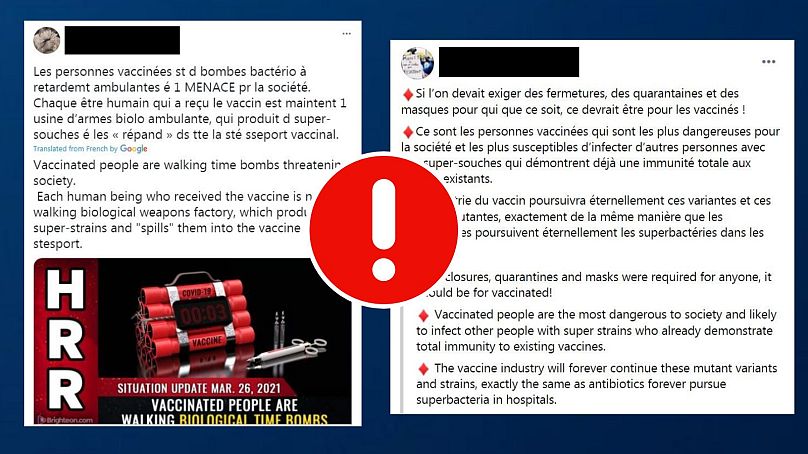False rumours have circulated on Facebook in France that vaccinated people are more likely to infect others with new strains. Immunologists and the WHO have reiterated that there is "no evidence" of this.
The World Health Organization (WHO) has rejected claims that COVID-19 vaccines are causing new variants of the virus.
Reports have circulated online in France saying that vaccinated people are "more likely" to infect others with "super-strains" of the coronavirus.
But the WHO and other immunologists have said that these claims are unfounded and have no scientific basis.
"There is no evidence of this," a WHO spokesperson Euronews. "Vaccination is part of the solution for suppressing transmission along with existing public health measures."
Online misinformation about the coronavirus and vaccines has been a thorn for European governments and their inoculation strategies.
A March poll by Ipsos found that just 59% of adults in France intend to get vaccinated against COVID-19, compared to Italy (85%) and Spain (82%).
"The number one message is 'get the vaccine out' as it will stop the virus," said Professor Luke O'Neill, an immunologist at Trinity College Dublin.
"Any sort of suggestion that the vaccines are making things worse is completely the opposite message to give out," he added.
"It's an emergency, we must get as many people vaccinated as we can to stop variants emerging and to stop the virus from spreading."
The misinformation spreading online
Since last week, multiple French social media accounts have claimed, without evidence, the COVID-19 vaccines are causing variants of the virus to emerge.
A number of pages shared a link to an article, which alleged that vaccinated citizens are "walking bacteriological time bombs" and are a "threat to society".
The article went on to falsely allege that vaccinated people are "most likely to infect other people with super-strains".
The theories have been shared across various Facebook and Twitter pages, such as in Lyon and Nice, as well as across the border to Switzerland. One Twitter account pushing the same false claim has more than 6,300 followers.
Meanwhile, a Facebook page sharing the article's content has more than 33,000 likes and 52,000 followers.
But the WHO, which has been tracking virus mutations and variants since the start of the COVID-19 outbreak, has reiterated that there is no evidence to support the article's claims.
"Vaccines will decrease replication on the virus, they do not cause variants," added Prof O'Neill.
The science behind new variants of COVID-19
Variants and new strains of the novel coronavirus have emerged in recent months in South Africa, Brazil and the United Kingdom, which were reported to be more infectious.
But the behaviour of variants is not linked to COVID-19 vaccines, and instead can be originated when the virus transmits and spreads.
Prof O'Neill told Euronews that the emergence of virus variants is a "random process".
"Every time the virus divides and makes a copy of itself, it makes a tiny error, and there is a chance that these errors can be more troublesome," he said.
"Vaccines bring out the human immune system to kill the virus, that stops it replicating and therefore the chance of variants emerging is decreased."
"The vaccine is boosting the immune response so variants are not emerging in vaccinated people at all, it's more likely they appear in people who do not have an immune response."
Pointing to the flu vaccine, Prof O'Neill said that there has "never" been a known vaccine that has driven an evolutionary change and caused more dangerous variants.
In a statement to Euronews, the WHO also reiterated that vaccines will reduce the spread of new virus strains.
"When a virus - including SARS-CoV-2 - is widely circulating in a population and causing many infections, the likelihood of the virus mutating increases," a spokesperson said.
"The more opportunities a virus has to spread, the more it replicates – and the more opportunities it has to undergo changes.
"Rolling out vaccines as quickly and widely as possible is critical to protecting people before they are exposed to the virus and the risk of new variants."












